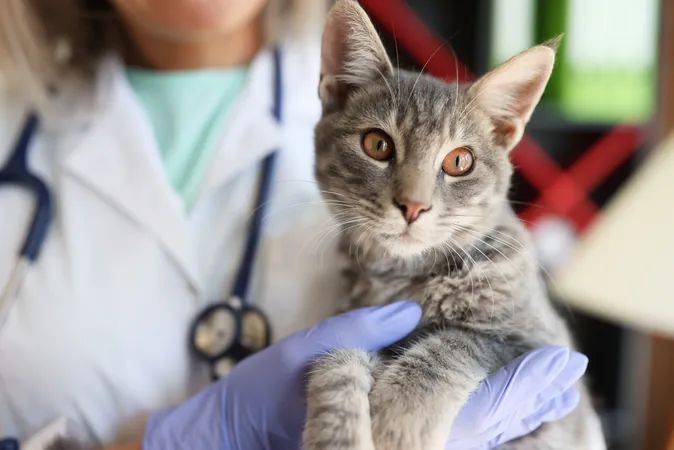
The Hopeful New Era of Feline Infectious Peritonitis (FIP): Essential Insights for Cat Owners
2025-04-21
Author: Nur
Understanding FIP: A Cat Owner's Guide
Feline Infectious Peritonitis (FIP) has long been a devastating concern for cat owners, historically seen as a fatal diagnosis. Fortunately, with significant advancements in veterinary medicine, there is now a glimmer of hope for cats afflicted by this serious illness.
At DNA Vetcare, we've seen remarkable success in treating FIP, and we are dedicated to providing cat owners with the latest, most relevant information concerning this condition.
What Is FIP?
FIP stems from a feline coronavirus – part of the same family as the virus that causes COVID-19. The crucial difference is that FIP is species-specific; it only targets cats and is not transmissible to humans or other animals.
Most cats exposed to the common feline coronavirus showcase mild symptoms or none at all. Yet, in about 10% of cases, the virus mutates within a cat's body, affecting white blood cells and triggering an abnormal immune response that can lead to FIP.
Recognizing FIP: Symptoms to Watch For
FIP can manifest in different forms, depending on the cat's immune response. The two primary types are:
- **Wet (Effusive) FIP:** Characterized by fluid buildup in the abdomen or chest, leading to symptoms like lethargy, weight loss, and fever that doesn't respond to antibiotics.
- **Dry (Non-effusive) FIP:** More insidious, this form affects various organs, including the brain and eyes, presenting symptoms such as weight loss, persistent fever, neurological issues, and vision changes.
Both types can also Cause other signs including diarrhea, vomiting, and loss of appetite.
Is FIP Contagious?
While FIP is not highly contagious, the underlying feline coronavirus spreads easily, particularly in multi-cat environments. Households and shelters with multiple cats may see higher risks, but not all cats exposed will develop FIP.
Diagnosing FIP: The Challenges
Detecting FIP can be a complex process, as there isn't a single test that confirms the condition. Veterinarians often utilize a combination of blood tests, imaging (like ultrasounds or X-rays), and sometimes biopsies to make an accurate diagnosis.
The Revolutionary Treatment Options
Until recently, FIP was deemed untreatable, but revolutionary antiviral therapies similar to remdesivir (used for COVID-19) are now changing the game. These medicines inhibit the virus's replication, giving the cat's immune system a fighting chance.
However, keep in mind:
- **Cure is not guaranteed:** Many FIP patients are severely ill by the time they receive treatment.
- **Cost considerations:** Treatment can be expensive and requires weeks of medication.
- **Availability of drugs:** Access has improved but can still be inconsistent.
Preventing FIP: Best Practices
Although a vaccine exists, it is not widely available in the UK. To mitigate the risks of FIP, it's crucial to:
- Reduce stress in homes with multiple cats.
- Maintain clean litter boxes and avoid overcrowding.
- Ensure regular veterinary check-ups to promote overall health.
A Brighter Future for Cats with FIP
The outlook for cats diagnosed with FIP has transformed dramatically in recent years. What was once regarded as a death sentence now has potential for effective treatment.
If you're concerned that your cat may have FIP, early diagnosis and veterinary intervention are critical. Your pet's health is our utmost priority, and we are here to keep you informed about the latest advancements in veterinary care. Don't hesitate to reach out with any questions or concerns regarding FIP.




 Brasil (PT)
Brasil (PT)
 Canada (EN)
Canada (EN)
 Chile (ES)
Chile (ES)
 Česko (CS)
Česko (CS)
 대한민국 (KO)
대한민국 (KO)
 España (ES)
España (ES)
 France (FR)
France (FR)
 Hong Kong (EN)
Hong Kong (EN)
 Italia (IT)
Italia (IT)
 日本 (JA)
日本 (JA)
 Magyarország (HU)
Magyarország (HU)
 Norge (NO)
Norge (NO)
 Polska (PL)
Polska (PL)
 Schweiz (DE)
Schweiz (DE)
 Singapore (EN)
Singapore (EN)
 Sverige (SV)
Sverige (SV)
 Suomi (FI)
Suomi (FI)
 Türkiye (TR)
Türkiye (TR)
 الإمارات العربية المتحدة (AR)
الإمارات العربية المتحدة (AR)